Michael Patrick Hicks's Blog, page 14
June 21, 2018
Review: Devil Sharks by Chris Jameson
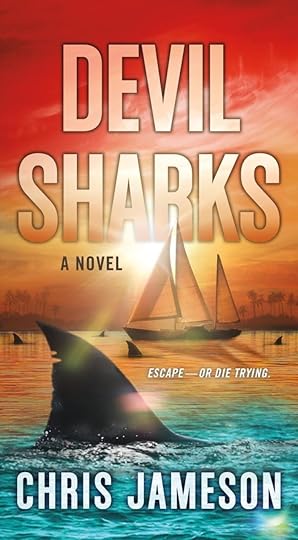
Devil Sharks: A Novel
By Chris Jameson
My rating: 4 of 5 stars
Just when you thought it was safe to go for a swim, Chris James returns with another shark themed horror standalone following last year's release of Shark Island. Packed with plenty of summertime thrills, Devil Sharks would be a perfect beach-read if only Jameson didn't make you deathly afraid of being so close to the water.
Here, a group of now-distant college buddies meet up in Hawaii for a reunion. Invited by their former classmate Harry, now an uber-rich businessman, the group and their spouses expect to enjoy a few days of sun and surf aboard a luxury sailing yacht. After visiting the abandoned Coast Guard station where Harry's father once served, the group find themselves adrift off an atoll and at the mercy of drug runners using the old building as a base. Surrounding the atoll are sharks - sharks the pirates have been routinely feeding humans to, and who have since developed a lust for the taste of landlubbers.
Devil Sharks is, first and foremost, a work of survival horror. Things get off to a bit of a slow start as Jameson lays the groundwork on who his characters are and explores their relationships to one another, but once this book kicks into high gear, good lord this sucker is frenetic.
Jameson takes our cast, a wonderfully diverse group fronted by Alex and his wife Sammi, and puts them into one deathly encounter after another. As I said, this is a book about survival, and Jameson puts a ton of obstacles in the cast's way. Much like the pirates, Jameson is a take-no-prisoners type of author, and Devil Sharks takes some shockingly bleak turns. I will say, though, that I was a tiny bit disappointed by the somewhat ancillary nature of the pirates, but I get what the author was going for with them. They're certainly capable and loathsome antagonists, but ones that exist largely as a plot device to kick the story's central hook into focus.
Devil Sharks is not a Die Hard riff of Alex versus hardcore killers - although I thought for a moment that's where Jameson was headed - but a story of your common Everyman characters against the impossible odds of hungry, man-eating sharks. We're here for the sharks, first and foremost, and the pirates are a way of getting us there, even if their presence makes the story feel slightly unbalanced as a whole. While some of the story threads are left unresolved (but hey, c'est la vie!), their purpose in serving the plot is largely secondary; they're an appetizer to the main course. Devil Sharks is, naturally, all about the sharks - that's what we're here for! We want the threatening promise of fins in the water and lots of toothy shark carnage! And hoo boy, Jameson doesn't play any games on that front. In fact, Jameson proves to be just as bloodthirsty and merciless as his oceanic apex predators. Things get brutal quick.
The last half of Devil Sharks is absolutely fraught with tension and horrifying encounters. Once the action gets going, this book is impossible to set aside and I spent much of this book with my stomach churning like the frothy blood-red waters Jameson continually chummed. If you're looking for some wonderfully grisly and violent encounters with killer chondrichthyes, Devil Sharks viciously and unrelentingly delivers. Grab a beer and a blanket and hit up the beach with this one, but maybe take a moment to consider how badly you want to go for a swim and wonder, if only for a second or two, if you might become fish food.
[Note: I received an advanced copy of this title from the publisher, St. Martin's, via NetGalley.]
View all my reviews
June 18, 2018
Review: The Cabin at the End of the World by Paul Tremblay
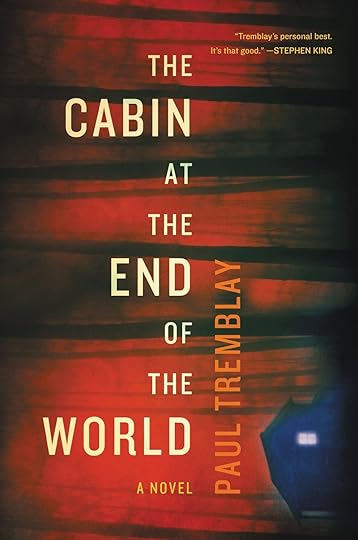
The Cabin at the End of the World: A Novel
By Paul Tremblay
My rating: 2 of 5 stars
The Cabin at the End of the World has a fantastic premise at its core, and if this story had been a novella or a 90-minute movie, I likely would have enjoyed it a whole lot more. Instead, Tremblay stuffs and stretches a simple yet awesome idea into a full-length novel that's both padded and repetitive to a frustrating degree.
Without spoiling things, The Cabin at the End of the World is a home invasion novel with apocalyptic overtones. Andrew and Eric, and their adopted Chinese daughter, Wen, are trapped inside their cabin, surrounded by four individuals who may or may not be totally insane.
To kick things off, we're first introduced to Wen in a much too long opening chapter that sees her collecting grasshoppers before meeting the strange and large Leonard, the leader of the group of intruders. The second chapter involves a very protracted round of "Let us in" "No, we won't let you in!" round-robin between the intruders and Andrew and Eric. You discover pretty quickly that Tremblay only has a couple ideas with which to prop up The Cabin at the End of the World, and a whole lot of pages are spent with repetitive dialogue as the characters go back and forth, and back and forth, and back and forth some more, arguing the same freaking points over and over and over and over and over in laborious fashion. These back and forths exhausting - not for the characters, oh no, not at all, but for the readers. These characters spend nearly three hundred pages arguing endlessly around a "You must do this!" "No, we will never do that!" premise. It's fucking tiring. That it's further padded with excruciating details about every freaking bit of furniture and blanket in the house helps not a whit.
Thankfully, these pointless circular exchanges are punctuated with some truly well drawn moments of violence and sequences of events that call into question the nature of this book's scenario as a whole. Unfortunately, Tremblay refuses to take a stand in regards to how much of his scenario is legitimate versus some of these characters simply being bugfuck crazy. You never know if the demands being placed upon Andrew and Eric have any sort of real meaning or not, and Tremblay argues both sides effectively but ultimately waffles on the credibility of the premise in order to be uber mysterioso. He wants his story to be both incredible and incredulous simultaneously, refusing to pick a side. Ultimately, this book comes off more like a Choose Your Own Adventure as told by a high school debate club, albeit one armed with some wicked home-made weaponry.
In terms of home invasion horrors, The Cabin at the End of the World has an excellent killer premise. In terms of execution, home invasion horror has been done far better in books like Jack Ketchum's Off Season and Brett McBean's The Invasion. Or you could just save a few days entirely, read something else, and pop in a Blu-ray copy of The Strangers.
[Note: I received an advance copy of this title from the publisher, William Morrow, via Edelweiss.]
View all my reviews
June 15, 2018
Review: Kill Creek by Scott Thomas [audiobook]
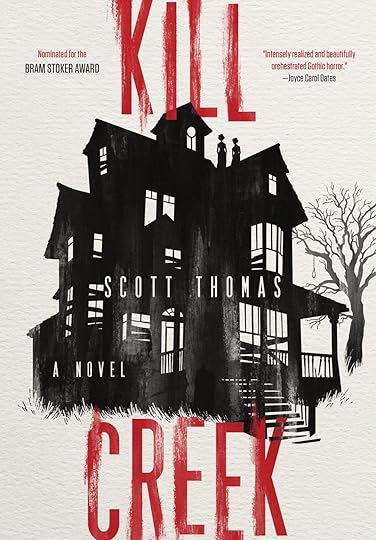
Kill Creek
By Scott Thomas
My rating: 5 of 5 stars
Scott Thomas makes one hell of a horror debut with his Stoker Award-nominated haunted house novel, Kill Creek - so strong a debut that I found it hard to believe he's a first-time author. Turns out, Thomas has a bit of a pedigree in television and was nominated for an Emmy for his work on the R.L. Stine TV series, The Haunting Hour. While Kill Creek is his first novel, Thomas definitely knows his way around a horror story, and his work here carries a nicely cinematic style with more than a few movie-ready scenes and set pieces.
After being duped into agreeing to an interview by an Internet website mogul, four authors find themselves unwittingly gathered together for an overnight stay at the abandoned and decrepit Finch House. For the wealthy Wainwright, this is a chance to speak to his idols, the modern masters of horror, and rake in lots of lucrative web-clicks. For the authors, it's a gimmicky way to promote their work, score some quick cash, and waste a night in a supposedly haunted house before returning to their lives, check in hand. If you know your way around a haunted house story, I don't have to tell you that things don't go quite according to plan...
Thankfully, Thomas throws in a few juicy curveballs here and there, slowly inching his narrative toward a finale of all-consuming madness that chills in all the best and brutal ways. Thomas, however, knows that he has to earn the premise's payoff, and he spends a lot of time building up his central cast. While the focus is on Sam McGarver, the most Everyman horror author of the bunch, characters like TC Moore, Sebastian Cole, and Daniel Slaughter - a horror-ready name if ever there was one - carry enough personality and intrigue to keep this slow-burn narrative hustling along. Moore, in fact, was my favorite character in this story - a brash, take-no-prisoners attitude, whiskey swilling, tough gal are always right up my alley narratively-speaking, and her introduction immediately captivated me.
Although it's become rather cliche to have a horror author as the protagonist of a horror novel, it works surprisingly well here. Usually the protag's occupation is ancillary, but in Kill Creek it's a primary focus and a linchpin for the work itself. Thomas is clearly well-versed in horror and genre tropes, as well as the career of writing and some of its more self-depreciating aspects. At one point, McGarver jokes that he's a writer, which means he spends most of his time procrastinating on the Internet. But it's his introduction as a college lecturer, wherein he delivers a presentation on gothic literature to his students, that makes a solid argument toward the credibility of not only McGarver's skill as an author, but Thomas's as well. The fact that Thomas creates this band of authors is one thing; the fact that he created them with such attention toward their pedigree and bibliographies is another. It's common to see horror authors experiencing a real-life horror event in fiction, but this is probably the first time I've wanted to actually read these fictional author's works. I wish I could buy a TC Moore book for my Kindle right now, or dig into a Sebastian Cole book next, and that alone should speak volumes to how much I appreciated Thomas's character work here.
Narrating Kill Creek is Bernard Setaro Clark, and hot damn, he's a fine reader. While much of his delivery is direct, Clark has a few aural tricks up his sleeve that really impressed me. Clark knows when to act up the material a bit, changing tones and pitch, and sometimes flat-out shouting, when needed. He also pulls this nifty trick of creating spatial distance between characters by turning away from the microphone at certain points. Say a character is shouting from across the room - rather than speaking directly into the mike as he would for our POV character, Clark turns away slightly, giving a sense of depth to sell the impression that there really is a character yelling from across the rom. It's such a simple thing, but so well executed, and not something I've often heard in other audiobooks. Of course, it's also possible I'm easily impressed, but I appreciated these moments a heck of a lot when they occurred. Clark's narrative skills certainly get a workout in the book's climax, as McGarver and company are forced to contend with the threats lurking within the Finch House once and for all.
Kill Creek isn't just a mighty fine haunted house novel, but a wickedly impressive debut for its author, who manages to wring the story for all its worth and deliver some pleasantly shocking twists along the way. This sucker builds like a roller coaster, slowly ratcheting its way to the top, and then violently dropping readers down a twisting thrill-ride that pulls their stomach up their throats. To put it mildly and succinctly, Kill Creek fucking rocks.
View all my reviews
June 13, 2018
Review: The Beast of Brenton Woods by Jackson R. Thomas
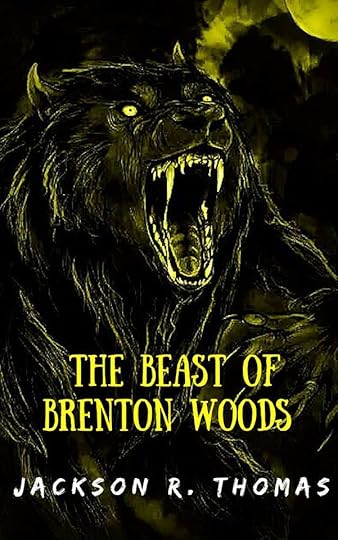
The Beast of Brenton Woods
By Jackson Thomas
My rating: 4 of 5 stars
There's something in the woods - white furred and enormous, with an insatiable appetite for violence...and revenge. The beast of Brenton Woods has a score to settle, and lots of blood to spill. Standing in its way, though, is an adolescent boy, his mother, and a local deputy, each of whom are ensnared in the search for this monster, and who are intent on uncovering its secrets, and possibly hiding a few of their own.
Jackson R. Thomas has crafted a really fun debut with The Beast of Brenton Woods, one with enough mystery to leave a few lingering questions that lead me to suspect we'll be seeing a sequel soon enough. Frankly, I wouldn't mind a return trip to Brenton Woods and seeing how the threads of this particular story can continue to unravel.
I quite enjoyed Ben, the thirteen-year-old at the heart of this book, and Deputy Kathy Wilcox, a tough gal who has little trouble asserting her dominance when needed. Equally enjoyable was Thomas's attention to carnage. Once The Beast of Brenton Woods gets going, this book becomes down right unputdownable, and blood splashes across the page. If you like your werewolves violent, and with not a whiff of paranormal shapeshifter romance to be found, Thomas should satisfy nicely. This is authentic werewolf horror, chockablock with mutilated corpses, and plenty of silver bullet-driven action.
The Beast of Brenton Woods is a blistering read of werewolf horror, one that chugs along at lightning speed and will leave you howling at the moon for more.
Note: The Beast of Brenton Woods is published by Alien Agenda Publishing, the publishing imprint of horror author Glenn Rolfe, which, as it turns out, makes for pretty companionable bedfellows. There's a certain aspect to Thomas's writing and storytelling that reminded me quite a lot of Rolfe's own work, and Glenn's readers should feel quite at home with this new author's debut. Glenn provided me with an advanced, uncorrected copy of this book, so many thanks to him.
View all my reviews
June 12, 2018
Guest Blog: Ghosts, Monsters and Myth: Cusp of Night by Mae Clair
Thank you, Michael, for hosting me on your blog today. I’d like to share my upcoming release, Cusp of Night, with your readers. A story that delves into the Spiritualist movement of the 19th Century, Cusp of Night also touches on ghosts and an urban legend in the present. Releasing June 12th, the book is currently available for pre-order from all online booksellers.
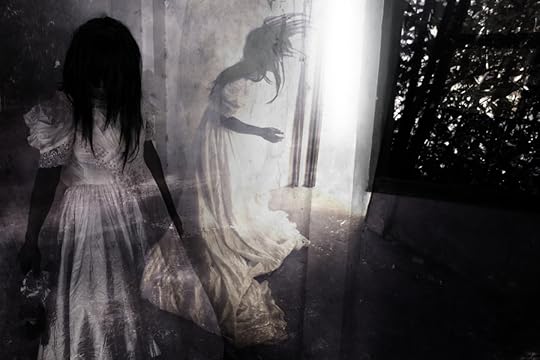
I’m a huge fan of creatures and things that go bump-in-the-night. In 2013 and 2014, I took two trips to research the Mothman, a cryptid that featured into my POINT PLEASANT SERIES. For my HODE’S HILL SERIES, I needed a new creature. Rather than use an existing monster from folklore, I decided to create my own. I’ve always been fascinated by Spring Heeled Jack and borrowed elements such as leaping fences and scrambling over rooftops to create “the Fiend.”
In the history of Hode’s Hill, the Fiend is responsible for several horrific murders in the late 1800s. The creature’s body was never found. Its legend has morphed into the stuff of urban myth. In the present, the town honors the past with an annual Fiend Fest in which contestants dress in costume, hoping to achieve the top prize.
My main character, Maya Sinclair, is on her way home from the Fiend Fest when she witnesses an assault on the patriarch of the town’s leading family. Is the assailant someone dressed in Fiend attire, or the creature returned from the shadows to wreak vengeance?
Cusp of Night is a blending of past and present, dual plotlines which converge in the legend of the Fiend—and restless ghosts the centuries have been unable to disperse.
Ghosts, monsters and myth. Here’s the blurb:
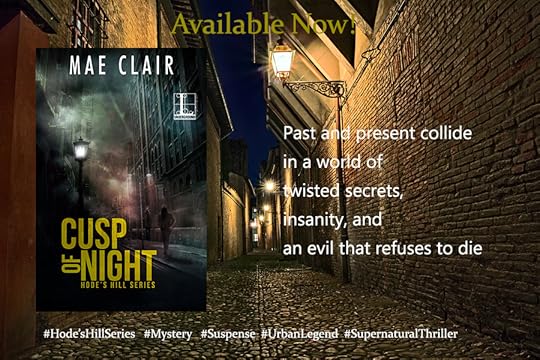
Blurb
Recently settled in Hode’s Hill, Pennsylvania, Maya Sinclair is enthralled by the town’s folklore, especially the legend about a centuries-old monster. A devil-like creature with uncanny abilities responsible for several horrific murders, the Fiend has evolved into the stuff of urban myth. But the past lives again when Maya witnesses an assault during the annual “Fiend Fest.” The victim is developer Leland Hode, patriarch of the town’s most powerful family, and he was attacked by someone dressed like the Fiend.
Compelled to discover who is behind the attack and why, Maya uncovers a shortlist of enemies of the Hode clan. The mystery deepens when she finds the journal of a late nineteenth-century spiritualist who once lived in Maya’s house--a woman whose ghost may still linger.
Known as the Blue Lady of Hode’s Hill due to a genetic condition, Lucinda Glass vanished without a trace and was believed to be one of the Fiend’s tragic victims. The disappearance of a young couple, combined with more sightings of the monster, trigger Maya to join forces with Leland’s son Collin. But the closer she gets to unearthing the truth, the closer she comes to a hidden world of twisted secrets, insanity, and evil that refuses to die . . .
You can find Mae Clair at the following haunts:
Website | Blog | Twitter | Newsletter | Facebook | Goodreads | Amazon | Other Social Links

June 11, 2018
Review: The Bog by Michael Talbot [audiobook]
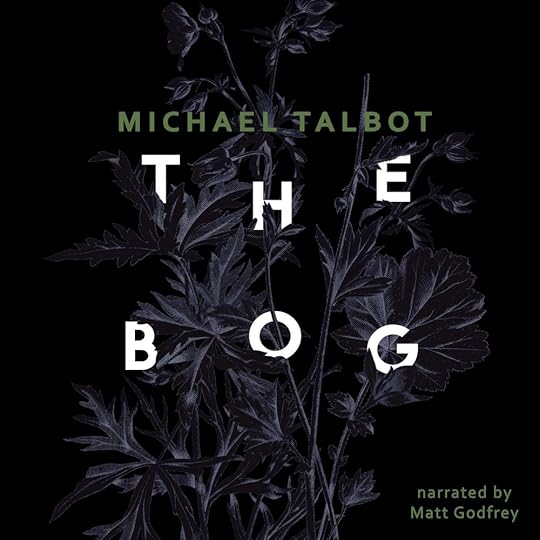
The Bog
By Michael Talbot
My rating: 4 of 5 stars
My original THE BOG audiobook review and many others can be found at Audiobook Reviewer.
The Bog is an old-school work of 1980s quiet horror. Michael Talbot slowly sets the stage, introducing archaeologist David Macauley and his family living abroad in the UK on a research grant. David specializes in studying bogs, particularly the corpses found preserved within. In a small English village, David uncovers not just a spate of bog bodies, but colorful legends – legends that point toward the true nature of an ancient evil responsible for the death of the bodies he is now unearthing. As readers slowly settle in for what first appears to be a creature feature, Talbot serves up a few interesting twists alongside a couple doses of personal tragedy and plenty of foreboding dread.
One of the things I most appreciated about The Bog was Talbot’s plotting. Even the most seemingly insignificant plot points and character beats play into the larger narrative and receive certain payoffs as the story resolves. A character’s veganism, a child’s fascination with the word ‘moxie’, a tavern’s clienteles apprehension over the appearance of a moth all lead to larger elements within the story, and the introduction of these minor points help to, in various ways, bring The Bog full-circle by book’s end. Throughout the story, Talbot introduces a number of concepts that I enjoyed quite a bit, particularly in regards to the nature of the evil infecting the small hamlet Macauley and his family find themselves inhabiting, which dovetails nicely with David’s work as a historian and scholar.
Reissued by Valancourt, The Bog is narrated by Matt Godfrey. I’ve only recently become familiar with Godfrey’s work, but he’s quickly earned with me the reputation of being a solid reader. I can expect a natural delivery complemented by subtle performances and distinct voice-work for each of the characters. In that regard, The Bog meets expectations. Each of the male and female characters presented here is clearly delineated and unmistakably unique. Listening to this book through my car’s audio system during my daily commute, I could not detect any flaws in the audio production, and the sound is crisp, clean, and well-modulated.
Readers looking for some high-end 80s horror should find a lot to enjoy in Talbot’s work. While The Bog is a bit of a slow-burn, it is ultimately quite enjoyable. Patient readers will be greatly rewarded by the way certain puzzle pieces of the plot align and snap into place as the story progresses.
View all my reviews
June 10, 2018
Review: Jurassic, Florida by Hunter Shea

Jurassic, Florida (Hunter Shea: One Size Eats All)
By Hunter Shea
My rating: 4 of 5 stars
Hands-down, Hunter Shea is one of the most consistently entertaining horror authors I've come across. I can always count on the man to deliver some truly fun, B-movie pulp in print form, and Jurassic, Florida is no exception. Dig it:
After an act of eco-terrorism against an off-shore oil rig large enough to rock the Richter scale, the residents of Polo Springs begin to notice a sudden increase in lizard activity. Sidewalks are cracking apart, giant holes are appearing in the ground, and iguanas are literally everywhere. If that weren't bad enough, Hurricane Ramona has its eyes set on Polo Springs, causing further calamity and unearthing even more iguanas. Big ones. Like, dinosaur big. Ancient, primitive, twenty-five foot tall iguanas. And those sumbitches are hungry!
Sounds like a good time, right? Well, it is. Like I said, Shea knows how to craft some wild creature features. Jurassic, Florida is a hell of a romp, too, filled with monsters, gore, and carnage, with the pace cranked up to rapid-fire. This one's a slim novella, and the story flies by at hurricane speed, driven by one event after another.
On the character front...well, this is the type of story you don't want to too attached to any one individual. Still, Shea makes a couple memorable figures here, such as Anna, the town's 18-year-old mayor. I wouldn't have minded a bit more backstory to her in regards to the particulars of her election, but screw it. You just gotta ride with it, and figure that if a real-life Alaskan town can have a cat mayor, then a fictional young adult like Anna at least stands half a chance of holding office, so why not? She gets some good moments to shine, as do Don and his family, and a sprightly, young lesbian couple. Don't expect everybody to make it through unscathed, though, and there were a few moments that manage to surprise me with just how blackhearted Shea can be. Good on him!
All in all, Jurassic, Florida is a heck of good time, and one that is reminiscent of natural horror flicks like Them!, and to a degree Godzilla, where giant animals turn the local human population into an all-you-can-eat buffet. By novella's end, I was hungry for more! Thankfully, Jurassic, Florida is the first in a trio of One Size Eats All novellas from Shea and Kensington/Lyrical Underground, so I'll be getting plenty more instances of crazy animals feasting on skewered humans. You really can't go wrong with that.
[Note: I received a copy of this title from the publisher, Kensington, via NetGalley.]
View all my reviews
June 8, 2018
Review: The Woman In The Woods by John Connolly
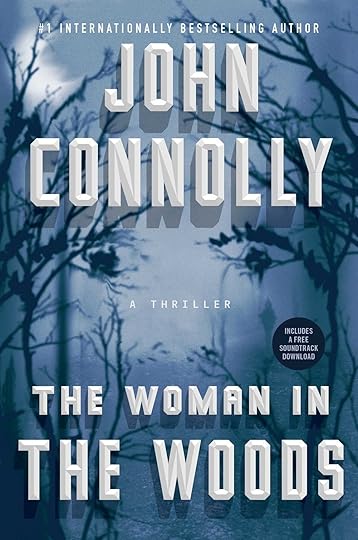
The Woman in the Woods: A Thriller (Charlie Parker)
By John Connolly
My rating: 5 of 5 stars
Deep in the Maine woods, a tree falls and unearths the remains of a woman, the only mark of her grave a Star of David carved into a nearby tree. Soon, a wave of violence will disrupt the lives of a handful of people as the search for the woman's child ensues, and the book the woman once possessed in the days leading to her demise. Drawn into this is Charlie Parker, a private investigator touched by darkness, and for whom violence surrounds him.
The Woman in the Woods is the 16th entry in John Connolly's Charlie Parker series, and its opening chapters carry with it an unmistakable dread. The threat and promise of death looms large over this series, naturally, but it feels more prominent here, more like a warning. Or, perhaps, more like a preparation. Parker and his associates are growing older, as is the author himself, who recently celebrated his 50th birthday, and who has been writing about Parker for going on 20 years. I can't help but feel like Connolly is beginning to move his pieces closer toward an end game, tightening the narrative threads of particular concepts introduced in previous entries and forcing his characters to reflect on the nature of their demise as a close ally to Parker faces the threat of cancer. Of course, long-time readers will know that not even death can spell the end of a character's story, but it still feels like the noose is tightening around the series and that its finale is soon to be upon us.
As with prior novels, Connolly gives us heartless killers with odd afflictions, detours into the supernatural, and glimpses of an overarching narrative involving the war of good against evil. In The Woman in the Woods, we find evil particularly emboldened. I believe this is the first Parker novel written squarely amidst the turmoil of the Trump presidency, a presidency that has served only to empower white supremacists. Beyond the murderous Quayle and his companion Mors, there is the threat of white supremacy and the burgeoning increase in bigotry and racism as represented by the Stonehursts, the youngest of whom rides around in a truck decorated with Confederate flags. Naturally, Luis takes some issues with this northernmost Confederate idiot, allowing readers to live vicariously in the nitwit's comeuppance. It's interesting to see how the Trump regime has impacted some of my favorite authors and their responses to the creeping nature of this odious moron's hate into their work. In Stephen King's The Outsider, we saw graves desecrated by swastikas, and Nicholas Sansbury Smith's Trackers series has provided a good bit of Neo-Nazi-punching heroics. Sadly, the normalizing of these repugnant attitudes by the right-wing is now common place and hate crimes have been on the rise ever since Trump took office, so it's quite refreshing to see characters like Charlie Parker and Luis taking a stand against this all-too human evil. Their actions and reactions toward the Stonehursts had me smiling rather happily along the way, and I suspect this family of rich racists will be playing a larger role in the books to come.
There are few series that I look forward to with as much anticipation as a new Charlie Parker novel, and The Woman in the Woods delivers on a number of fronts. The characters and dialogue are as sharp as ever, and Connolly infuses the narrative with a sense of creeping dread, one that promises to deliver even more worry and upset in the near future. While I suspect we're finally getting close to the end of Parker's ultimate story, I certainly hope I'm wrong. There's nothing I'd like more than to keep on reading Connolly's series for many, many more years to come, but if the end of near, I believe Parker and company will be going out on a high note, and the end began here, with the discovery of a dead woman lost in the woods.
[Note: I received an advanced copy of this title from the publisher, Atria/Emily Bestler Books, via NetGalley.]
View all my reviews
June 5, 2018
Ten Summer Reads On My Radar
In my part of Michigan, we went from winter and straight into the hottest days of summer, bypassing spring altogether. Because of this, some of the books listed here are not officially summer reads by way of the calendar - the first day of summer isn't until June 21 - but since we've already had a streak of 90 degree days before May was even over, and the summer movie season now seems to kick off in late April, I figure they're fair game! That said, here's some of the forthcoming releases that have caught my eye.
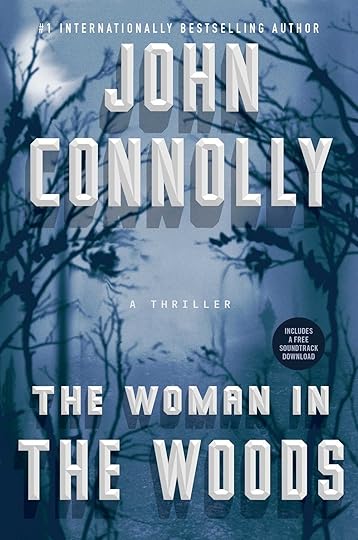
The Woman In the Woods by John Connolly
June 12, 2018 | Atria/Emily Bestler Books
From internationally bestselling author and “creative genius who has few equals in either horror fiction or the mystery genre” (New York Journal of Books) comes a gripping thriller starring Private Investigator Charlie Parker. When the body of a woman—who apparently died in childbirth—is discovered, Parker is hired to track down both her identity and her missing child.
In the beautiful Maine woods, a partly preserved body is discovered. Investigators realize that the dead young woman gave birth shortly before her death. But there is no sign of a baby.
Private detective Charlie Parker is hired by a lawyer to shadow the police investigation and find the infant but Parker is not the only searcher. Someone else is following the trail left by the woman, someone with an interest in much more than a missing child…someone prepared to leave bodies in his wake.
And in a house by the woods, a toy telephone begins to ring and a young boy is about to receive a call from a dead woman.

Jurassic Florida by Hunter Shea
June 19, 2018 | Kensington
FLORIDA. IT’S WHERE YOU GO TO DIE.
Welcome to Polo Springs, a sleepy little town on Florida’s Gulf Coast. It’s a great place to live—if you don’t mind the hurricanes. Or the flooding. Or the unusual wildlife . . .
IGUANAS. THEY’RE EVERYWHERE.
Maybe it’s the weather. But the whole town is overrun with the little green bastards this year. They’re causing a lot of damage. They’re eating everything in sight. And they’re just the babies . . .
HUMANS. THEY’RE WHAT’S FOR DINNER.
The mayor wants to address the iguana problem. But when Hurricane Ramona slams the coast, the town has a bigger problem on their hands. Bigger iguanas. Bigger than a double-wide. Unleashed by the storm, this razor-toothed horde of prehistoric predators rises up from the depths—and descends on the town like retirees at an early bird special. Except humans are on the menu. And it’s all you can eat . . .
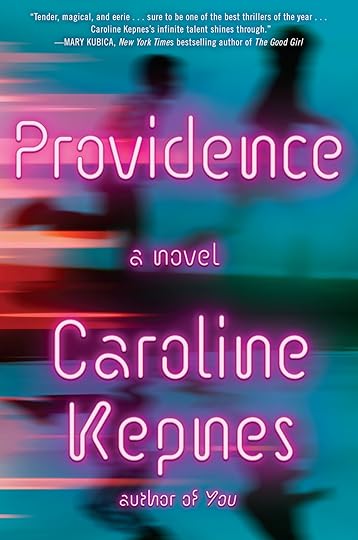
Providence by Caroline Kepnes
June 19, 2018 | Random House
Best friends in small-town New Hampshire, Jon and Chloe share a bond so intense that it borders on the mystical. But before Jon can declare his love for his soul mate, he is kidnapped, his plans for a normal life permanently dashed.
Four years later, Chloe has finally given up hope of ever seeing Jon again. Then, a few months before graduation, Jon reappears. But he is different now: bigger, stronger, and with no memory of the time he was gone. Jon wants to pick up where he and Chloe left off . . . until the horrifying instant he realizes that he possesses strange powers that pose a grave threat to everyone he cares for. Afraid of hurting Chloe, Jon runs away, embarking on a journey for answers.
Meanwhile, in Providence, Rhode Island, healthy college students and townies with no connection to one another are suddenly, inexplicably dropping dead. A troubled detective prone to unexplainable hunches, Charles “Eggs” DeBenedictus suspects there’s a serial killer at work. But when he starts asking questions, Eggs is plunged into a whodunit worthy of his most outlandish obsessions.
In this dazzling new novel—and with an intense, mesmerizing voice—Caroline Kepnes makes keen and powerful observations about human connection and how love and identity can dangerously blur together.
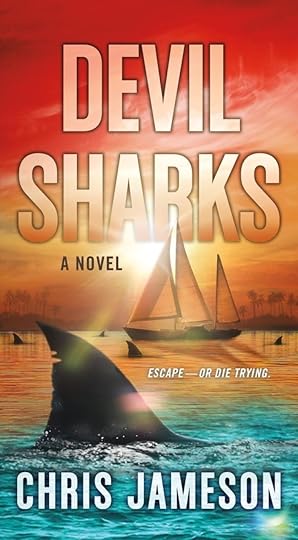
Devil Sharks by Chris Jameson
June 26, 2018 | St. Martin's
A pleasure cruise in Paradise leads a group of friends to a shark-infested Hell in Chris Jameson's Devil Sharks. . .
When Alex Simmons is invited to a college reunion in the Hawaiian islands aboard the private yacht of his old pal Harry Curtis, he is not sure what to expect. The two men had a falling-out years ago over the suicide of one of their friends. Could this be Harry’s way of making amends? Or is something more sinister in store?
The crew sets sail and arrives at Orchid Atoll, the site of a deserted former Coast Guard station. But they are far from alone. Out here, three hundred miles from civilization, Alex and his friends are about to encounter two very different brands of evil―one human, the other with fins―unlike anything they could have possibly imagined. They have entered a place where there’s no law, no mercy. . .and no way out.
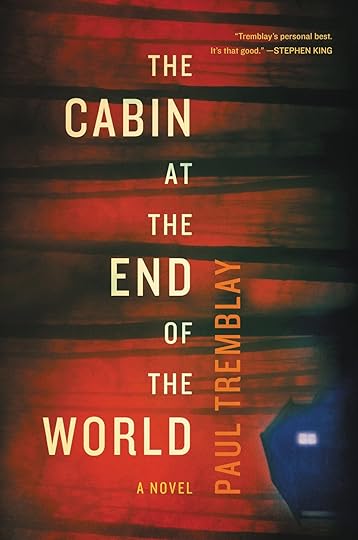
The Cabin At The End Of The World by Paul Tremblay
June 26, 2018 | William Morrow
“A tremendous book―thought-provoking and terrifying, with tension that winds up like a chain. The Cabin at the End of the World is Tremblay’s personal best. It’s that good.” — Stephen King
The Bram Stoker Award-winning author of A Head Full of Ghosts adds an inventive twist to the home invasion horror story in a heart-palpitating novel of psychological suspense that recalls Stephen King’s Misery, Ruth Ware’s In a Dark, Dark Wood, and Jack Ketchum’s cult hit The Girl Next Door.
Seven-year-old Wen and her parents, Eric and Andrew, are vacationing at a remote cabin on a quiet New Hampshire lake. Their closest neighbors are more than two miles in either direction along a rutted dirt road.
One afternoon, as Wen catches grasshoppers in the front yard, a stranger unexpectedly appears in the driveway. Leonard is the largest man Wen has ever seen but he is young, friendly, and he wins her over almost instantly. Leonard and Wen talk and play until Leonard abruptly apologizes and tells Wen, "None of what’s going to happen is your fault". Three more strangers then arrive at the cabin carrying unidentifiable, menacing objects. As Wen sprints inside to warn her parents, Leonard calls out: "Your dads won’t want to let us in, Wen. But they have to. We need your help to save the world."
Thus begins an unbearably tense, gripping tale of paranoia, sacrifice, apocalypse, and survival that escalates to a shattering conclusion, one in which the fate of a loving family and quite possibly all of humanity are entwined. The Cabin at the End of the World is a masterpiece of terror and suspense from the fantastically fertile imagination of Paul Tremblay.
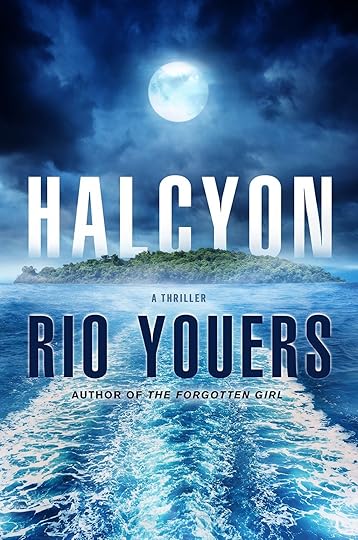
Halcyon by Rio Youers
July 10, 2018 | St. Martin's Press
HALCYON is the answer for all Americans who want to escape, but paradise isn't what it seems. A beautiful island in the middle of Lake Ontario—a self-sustaining community made up of people who want to live without fear, crime, or greed. Halcyon is run by Valerie Kemp, aka Mother Moon, benevolent and altruistic on the outside, but hiding an unimaginable darkness inside. She has dedicated her life to the pursuit of Glam Moon, a place of eternal beauty and healing. And she believes the pathway there can only be found at the end of pleasure.
On the heels of tragedy, Martin Lovegrove moves his family to Halcyon. A couple of months, he tells himself, to retreat from the chaos and grind. He soon begins to suspect there is something beneath Halcyon’s perfect veneer and sets out to discover the truth—however terrible it might be—behind the island and its mysterious founder, Mother Moon.
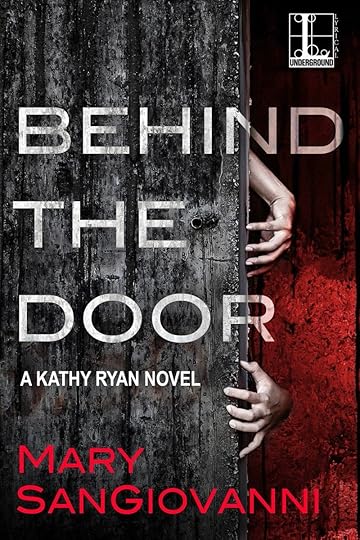
Behind the Door by Mary SanGiovanni
August 28, 2018 | Kensington
FIRST IN A NEW SERIES!
Occult specialist Kathy Ryan returns in this thrilling novel of paranormal horror from Mary SanGiovanni, the author of Chills . . .
Some doors should never be opened . . .
In the rural town of Zarepath, deep in the woods on the border of New Jersey and Pennsylvania, stands the Door. No one knows where it came from, and no one knows where it leads. For generations, folks have come to the Door seeking solace or forgiveness. They deliver a handwritten letter asking for some emotional burden to be lifted, sealed with a mixture of wax and their own blood, and slide it beneath the Door. Three days later, their wish is answered—for better or worse.
Kari is a single mother, grieving over the suicide of her teenage daughter. She made a terrible mistake, asking the powers beyond the Door to erase the memories of her lost child. And when she opened the Door to retrieve her letter, she unleashed every sin, secret, and spirit ever trapped on the other side.
Now, it falls to occultist Kathy Ryan to seal the door before Zarepath becomes hell on earth . . .
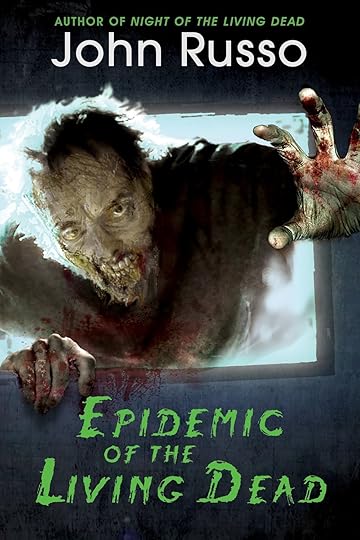
Epidemic of the Living Dead by John Russo
August 28, 2018 | Kensington
From the screenwriter of the original 1968 Night of the Living Dead comes a shocking new wave of zombie mayhem to devour your dreams—and feed your nightmares . . .
THEY ARE WHAT THEY EAT
It starts with infected needles. It spreads like a plague. Soon the town of Chapel Grove, Pennsylvania, is overrun with cannibalistic corpses. Some are taken down with a bullet to the brain. Others, torched like kindling. But a few have survived—inside a maternity ward . . .
THEY’RE EATING FOR TWO NOW
Detective Bill Curtis manages to rescue his pregnant wife Lauren from the ward in the nick of time. But the other pregnant women are not so lucky. Some of them have been bitten—and infected. Now it’s anyone’s guess what’s growing inside them . . .
THEY’RE THE NEXT GENERATION
But the nightmare isn’t over yet. The infected mothers’ newborns appear to be normal. But as the years go by, Bill and Lauren Curtis begin to worry about their beautiful, healthy daughter Jodie. Jodie is drawn to the town’s “special” children, the ones whose mothers were bitten. They’re reaching adolescence now. Their hormones are raging. And they’re starting to possess strange appetitites . . .
If you thought millenials werea pain, just wait until you meet Generation Z.
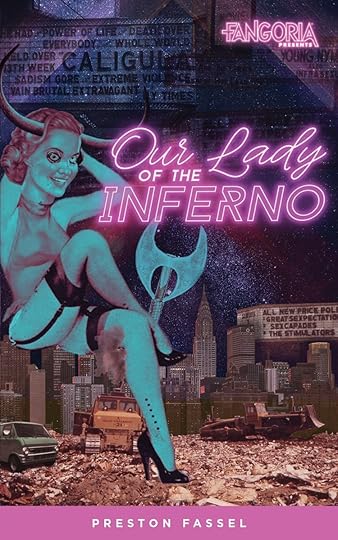
Our Lady of the Inferno by Preston Fassel
September 11, 2018 | Cinestate
FANGORIA PRESENTS #1, COMING THIS SEPTEMBER!
Spring, 1983. Sally Ride is about to go into space. Flashdance is a cultural phenomenon. And in Times Square, two very deadly women are on a collision course with destiny-- and each other.
At twenty-one, Ginny Kurva is already legendary on 42nd Street. To the pimp for whom she works, she's the perfect weapon-- a martial artist capable of taking down men twice her size. To the girls in her stable, she's mother, teacher, and protector. To the little sister she cares for, she's a hero. Yet Ginny's bravado and icy confidence hide a mind at the breaking point, her sanity slowly slipping away as both her addictions and the sins of her past catch up with her...
At thirty-seven, Nicolette Aster is the most respected woman at the Staten Island Landfill. Quiet and competent, she's admired by the secretaries and trusted by her supervisors. Yet those around her have no idea how Nicolette spends her nights-- when the hateful madness she keeps repressed by day finally emerges, and she turns the dump into a hunting ground to engage in a nightmarish blood sport...
In the Spring of 1983, neither Ginny nor Nicolette knows the other exists. By the time Summer rolls around, one of them will be dead.
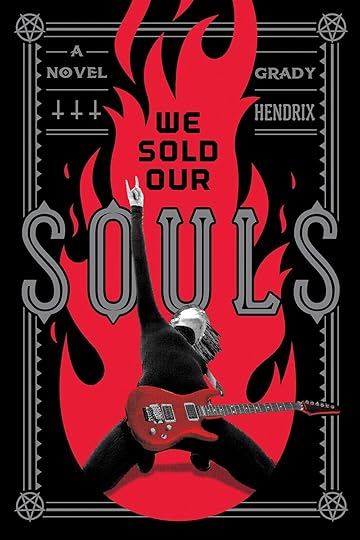
We Sold Our Souls by Grady Hendrix
September 18, 2018 | Quirk Books
Faust meets rock/heavy metal in this new novel of supernatural horror (and pop culture) by the author of HORRORSTOR, MY BEST FRIEND'S EXORCISM, and PAPERBACKS FROM HELL.
In the 1990s, heavy metal band Dürt Würk was poised for breakout success -- but then lead singer Terry Hunt embarked on a solo career and rocketed to stardom as Koffin, leaving his fellow bandmates to rot in rural Pennsylvania. Two decades later, former guitarist Kris Pulaski works as the night manager of a Best Western - she's tired, broke, and unhappy. Everything changes when she discovers a shocking secret from her heavy metal past: Turns out that Terry's meteoric rise to success may have come at the price of Kris's very soul.
This revelation prompts Kris to hit the road, reunite with the rest of her bandmates, and confront the man who ruined her life. It's a journey that will take her from the Pennsylvania rust belt to a Satanic rehab center and finally to a Las Vegas music festival that's darker than any Mordor Tolkien could imagine. A furious power ballad about never giving up, even in the face of overwhelming odds, We Sold Our Souls is an epic journey into the heart of a conspiracy-crazed, paranoid country that seems to have lost its very soul...where only a girl with a guitar can save us all.
May 27, 2018
Review: The Outsider by Stephen King
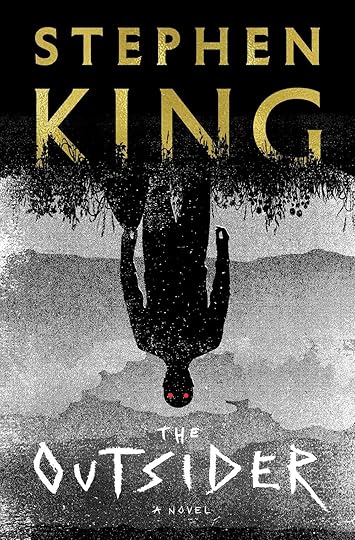
The Outsider: A Novel
By Stephen King
My rating: 5 of 5 stars
After a rather dismal outing in Sleeping Beauties, my first Stephen King novel in a handful of years, I had kept my expectations for The Outsider firmly in check. I went into this novel with the expectation and hope that I would, at the very least, like it. Turns out, I freaking loved it!
Right from the very start, King grabbed me. And he didn't let go for the entire book's duration. The Outsider is gripping from page one, and reminds us why Stephen King is a storytelling master. Opening with a section called "The Arrest," King gives us a bit of a double-narrative. In the present-day, Detective Ralph Anderson is set to make an arrest in a gruesome homicide of a young boy. Jogging alongside this build-up toward the arrest is a bit of backstory, told through witness interviews, and police, forensic, and morgue reports, that give us the inside scoop on the victim and the perpetrator, Terry Maitland, a youth baseball coach in the midst of a season-ending game in a packed stadium. Anderson wants Maitland's arrest public, to be a spectacle of shame, and the case against Maitland is airtight - they have his DNA, his fingerprints, a number of witnesses accounting for virtually every one of his movements immediately leading up to and following the murder. It's an open and shut case.
Until it isn't. Until King starts to sow seeds of doubt into the case, small seeds initially, which blossom into wild, unexpected growths, and bits of information that blow the entire case apart and leave Anderson reeling.
The Outsider begins as a police procedural, one that sinks its hooks in deep with its compelling narrative and characters. Regarding the heinous murder of a child, it would have been easy for King to go the route of gruesome, exploitative shock if he wanted. Instead, he approached the case with an almost clinical detachment, delivering the details through impersonal reports from the various departments involved in a murder investigation. He let's us build our own nightmares from the information imparted in these transcriptions, which is a brilliant way to do it. There's a reason King is the Master of Horror, and The Outsider is very much a horror novel. The procedural elements are merely prelude, the meat and potatoes of the narrative backbone that get us to where we're going. What begins as a story of a very real human monster eventually takes on supernatural overtones as the narrative shifts toward the inexplicable. King's Constant Readers will likely find plenty of reason to celebrate the subtle links and parallels established between this work and earlier stories, including the Bill Hodges trilogy.
Some hash has been made over whether or not The Outsider is a continuation of the Hodges trilogy. I can't speak to that, as I never read that trilogy, but I am aware that the character of Holly Gibney appeared previously in those books. The Outsider is intended to be a standalone novel and works perfectly well on its own. However, Holly's introduction here necessitates the revealing of plenty of information regarding the Hodges trilogy by King. If, like me, you haven't read those prior books, you can expect a lot of spoilers for them throughout the last half of The Outsider. So, take that as you will and determine how to proceed.
If you don't mind having the Hodges books spoiled, then absolutely read The Outsider immediately. Do it right now. This book is simply that good. It's easily one of the most compelling narratives I've read this year, and the way King builds this book, effortlessly shifting from police procedural to horror, and injecting enough shocks to keep readers on their toes the whole way through, is absolutely masterful.
The Outsider could have been another phoned-in affair, like Under the Dome, which oftentimes felt like a Greatest Hits retread of King's most prominent works, or worse, Sleeping Beauties, a joyless and dull co-written imitation of King's epics that never captured any of the magic. Instead, this is a pure shot of adrenalized King straight to the heart. It's powerful and gripping, and a whole lot of damn fun, and it sucked me in deep enough that I was positively living this book the whole time it took me to read it. After more than 50 published novels to his credit, there's little reason for The Outsider to be as good as it is, and yet it's not just good - it's one of King's best. Not just one of his best in years, mind you, but one of his best period. This is the Master of Horror doing what he does best - giving us convincing characters alongside a larger-than-life horror, and scaring the hell out of us along the way.
View all my reviews



